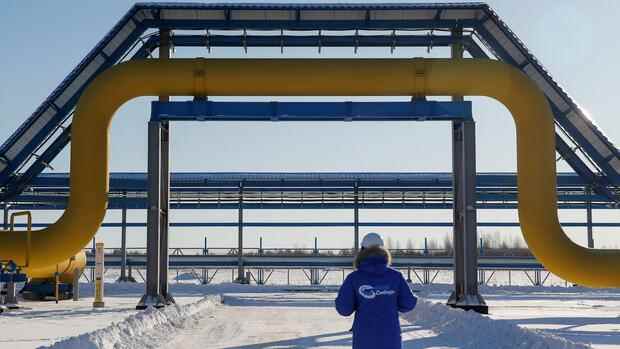Berlin, Moscow According to its own statements, after Russia ordered the conversion of gas payments to rubles, Russia continues to deliver the raw material in large quantities for transit through Ukraine to Europe. On Friday, 108.4 million cubic meters of gas would be pumped through the pipeline system, energy giant Gazprom spokesman Sergey Kupriyanov said, according to the Interfax agency. This almost corresponds to the contractually possible maximum utilization.
Nevertheless, there are great fears in the German economy that the Federal Republic could plunge into a serious crisis. BASF CEO Martin Brudermüller warned of unprecedented economic damage in the event of an import stop or a long-term failure of gas and oil supplies from Russia. “That could bring the German economy into its worst crisis since the end of the Second World War,” said Brudermüller of the “Frankfurter Allgemeine Sunday newspaper”.
The construction and energy expert Lamia Messari-Becker, who advises the federal government, warned of the devastating consequences of a stop in Russian gas supplies. “If basic materials industries came to a standstill, there would be a domino effect that would be unstoppable and difficult to repair,” she told the German Press Agency.
Siemens Energy CEO Christian Bruch said in an interview with the Handelsblatt that a short-term boycott would have a greater negative impact on Germany than on Russia. For some industries, the gas supply is existential, he said with a view to the glass industry, for example.
Top jobs of the day
Find the best jobs now and
be notified by email.
According to the Russian statement, Western countries such as Germany must open accounts with Gazprombank from Friday in order to continue receiving gas. Otherwise, deliveries to “unfriendly countries” would be stopped, President Vladimir Putin had announced.
The states must therefore ensure payment in Russian currency via the accounts that have an area for currencies – i.e. euros or dollars – and one for rubles. Euros or dollars could still be deposited into the Russian account. Gazprombank then exchanges the money for rubles and transfers the amount to Gazprom.
>> Read about this: Putin signs gas decree – Western customers must purchase through Russian bank
The federal government insists that payments must be made in euros or dollars, as agreed. The exact effects of the changed modalities remained unclear despite initially continuing deliveries. Analysts in Moscow assume that the system will not be fully effective until April and May. However, experts do not expect major consequences for German companies.
Companies are preparing for shutdown scenarios
The company is closely monitoring developments. At the Salzgitter steel group, it was said: “Without natural gas, there would be no production of steel.” Politicians must be aware that the energy supply and the energy transition depend on production, said a company spokesman.
Glass manufacturer Wiegand is preparing for a shutdown scenario. “We are currently working on how, in the worst case, we can shut down the furnaces ourselves in a controlled manner,” said Managing Director Nikolaus Wiegand. In eleven such furnaces, the company on the border between Bavaria and Thuringia keeps thousands of tons of glass at a temperature of around 1600 degrees Celsius around the clock. If the flow of gas dried up overnight, the glass would get cold and harden. The melting tanks could then no longer be saved – a loss in the millions.
The Federal Ministry of Economics announced the early warning level of the gas emergency plan on Wednesday, the first of three levels. This is intended to strengthen the provision for a delivery stop. The appeal went to consumers and companies to save energy.
Volkswagen announced that the supply of gas is currently secured for the VW plants and the brands in Germany. According to a spokesman, the company is in regular contact with authorities, network operators and suppliers. At Mercedes-Benz, it was said that the Stuttgart-based company was constantly examining ways to save energy and are now stepping up these efforts.
A gas supply stop would be fatal for energy-intensive industries.
(Photo: dpa)
The Darmstadt-based pharmaceutical and technology group Merck explained that in the event of an energy shortage, it is expected “that we will receive the necessary resources to maintain our production and services in the area of critical infrastructure”.
The technology group Bosch announced that it can currently supply its production and operating facilities unchanged and is observing the energy market. With a view to the early warning level, it was said that preparations were being made for various scenarios and that precautions were being taken “to continue to ensure the supply of our customers in the event of a regulation of the gas supply or to keep possible effects as low as possible”.
>>Read here: Putin’s master plan for oil and gas: Europe should remain open to blackmail
Expert Messari-Becker emphasized that the construction industry depends on gas-intensive industries such as the chemical, steel and cement industries. “Almost half a million jobs would be affected in the main construction industry.” She called on politicians to mobilize all national reserves and, if necessary, to consider extending the service lives of conventional power plants, such as coal-fired power plants.
The primary goal must be to prevent “economic triage” by all means, said Messari-Becker. By this, the expert means a scenario in which, in the event of bottlenecks, certain companies and facilities would be given priority to be supplied with gas – based on the medical term “triage”. Such prioritization would apply, for example, if the highest level of the gas emergency plan were to be announced in Germany.
More: Save yourself if you can: This is how companies want to get rid of their delivery obligations in the event of a gas embargo
